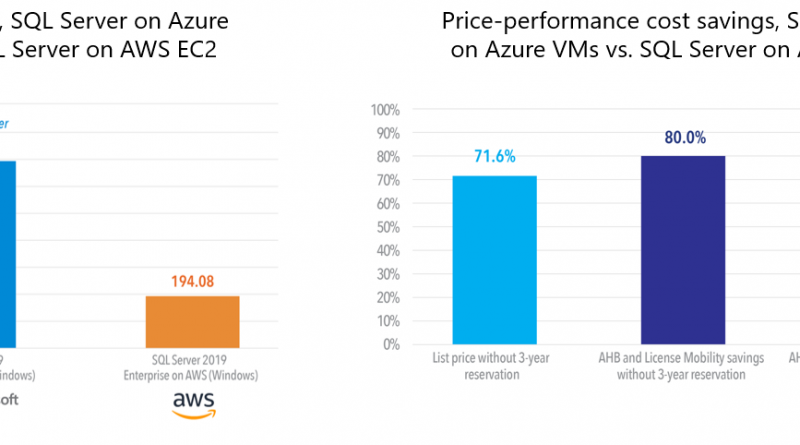SQL Server runs best on Azure. Here’s why.
SQL Server customers migrating their databases to the cloud have multiple choices for their cloud destination. To thoroughly assess which cloud is best for SQL Server workloads, two key factors to consider are:
-
Innovations that the cloud provider can uniquely provide.
-
Independent benchmark results.
What innovations can the cloud provider bring to your SQL Server workloads?
As you consider your options for running SQL Server in the cloud, it's important to understand what the cloud provider can offer both today and tomorrow. Can they provide you with the capabilities to maximize the performance of your modern applications? Can they automatically protect you against vulnerabilities and ensure availability for your mission-critical workloads?
SQL Server customers benefit from our continued expertise developed over the past 25 years, delivering performance, security, and innovation. This includes deploying SQL Server on Azure, where we provide customers with innovations that aren’t available anywhere else. One great example of this is Azure BlobCache, which provides fast, free reads for customers. This feature alone provides tremendous value to our customers that is simply unmatched in the market today.
Additionally, we offer preconfigured, built-in security and management capabilities that automate tasks like patching, high availability, and backups. Azure also offers advanced data security that enables both vulnerability assessments and advanced threat protection. Customers benefit from all of these capabilities both when using our Azure Marketplace images and when self-installing SQL Server on Azure virtual machines.
Only Azure offers these innovations.
What are their performance results on independent, industry-standard benchmarks?
Benchmarks can often be useful tools for assessing your cloud options. It's important, though, to ask if those benchmarks were conducted by independent third parties and whether they used today’s industry-standard methods.

The images above show performance and price-performance comparisons from the February 2020 GigaOm performance benchmark blog post.
In December, an independent study by GigaOm compared SQL Server on Azure Virtual Machines to AWS EC2 using a field test derived from the industry standard TPC-E benchmark. GigaOm found Azure was up to 3.4x faster and 87 percent cheaper than AWS.1 Today, we are pleased to announce that in GigaOm’s second benchmark analysis, using the latest virtual machine comparisons and disk striping, Azure was up to 3.6x faster and 84 percent cheaper than AWS.2 These results continue to demonstrate that SQL Server runs best on Azure.
Get started today
Learn more about how you can start taking advantage of these benefits today with SQL Server on Azure.
1Price-performance claims based on data from a study commissioned by Microsoft and conducted by GigaOm in October 2019. The study compared price performance between SQL Server 2017 Enterprise Edition on Windows Server 2016 Datacenter edition in Azure E64s_v3 instance type with 4x P30 1TB Storage Pool data (Read-Only Cache) + 1x P20 0.5TB log (No Cache) and the SQL Server 2017 Enterprise Edition on Windows Server 2016 Datacenter edition in AWS EC2 r4.16xlarge instance type with 1x 4TB gp2 data + 1x 1TB gp2 log. Benchmark data is taken from a GigaOm Analytic Field Test derived from a recognized industry standard, TPC Benchmark™ E (TPC-E). The Field Test does not implement the full TPC-E benchmark and as such is not comparable to any published TPC-E benchmarks. Prices are based on publicly available US pricing in West US for SQL Server on Azure Virtual Machines and Northern California for AWS EC2 as of October 2019. The pricing incorporates three-year reservations for Azure and AWS compute pricing, and Azure Hybrid Benefit for SQL Server and Azure Hybrid Benefit for Windows Server and License Mobility for SQL Server on AWS, excluding Software Assurance costs. Actual results and prices may vary based on configuration and region.
2Price-performance claims based on data from a study commissioned by Microsoft and conducted by GigaOm in February 2020. The study compared price performance between SQL Server 2019 Enterprise Edition on Windows Server 2019 Datacenter edition in Azure E32as_v4 instance type with P30 Premium SSD Disks and the SQL Server 2019 Enterprise Edition on Windows Server 2019 Datacenter edition in AWS EC2 r5a.8xlarge instance type with General Purpose (gp2) volumes. Benchmark data is taken from a GigaOm Analytic Field Test derived from a recognized industry standard, TPC Benchmark™ E (TPC-E). The Field Test does not implement the full TPC-E benchmark and as such is not comparable to any published TPC-E benchmarks. Prices are based on publicly available US pricing in West US for SQL Server on Azure Virtual Machines and Northern California for AWS EC2 as of January 2020. The pricing incorporates three-year reservations for Azure and AWS compute pricing, and Azure Hybrid Benefit for SQL Server and Azure Hybrid Benefit for Windows Server and License Mobility for SQL Server in AWS, excluding Software Assurance costs. Actual results and prices may vary based on configuration and region.
Source: Azure Blog Feed
